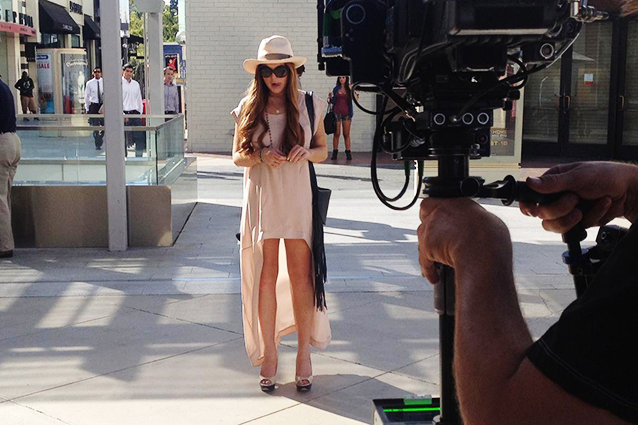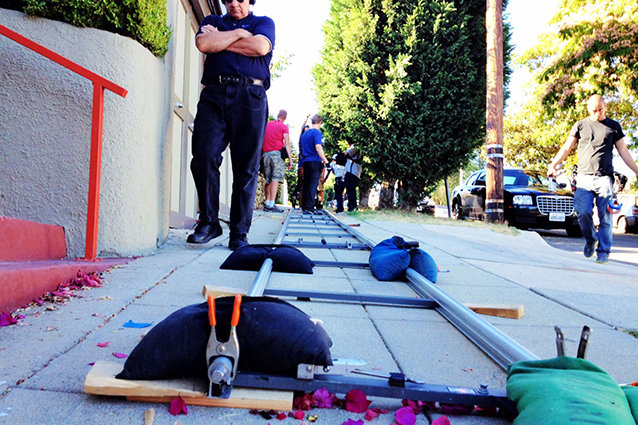Paul Schrader is truly a man of the cinema. Which is incredible considering that his strict Calvinist upbringing prevented him from even seeing a movie until his late teens. But the screenwriter of Taxi Driver and Raging Bull and the director of American Gigolo, Cat People, and Affliction certainly made up for lost time. Fiercely independent, Schrader’s intellectual cinema has become increasingly difficult to fund over the years. After a failed attempt at directing an Exorcist prequel, he needed to turn to Kickstarter to fund his most recent film, The Canyons.
It’s a movie that received a whirlwind of buzz when Schrader cast Lindsay Lohan as its lead. And even more buzz following a New York Times Magazine article last January that painted the microbudget indie’s production as nearly derailed by Lohan’s bad behavior. In reality, Schrader needed Lohan as much as Lohan needed Schrader. We caught up with the director in time for The Canyons’ limited release this weekend.

Hollywood.com: The Canyons reminds me of Jean Renoir’s The Rules of the Game: everyone agrees adultery is acceptable as long as there is no emotional attachment. I know The Rules of the Game is one of your favorite films. Do you see a connection between the two movies?
Paul Schrader: In their underlying plot structure, definitely. Both films create two love triangles and have them share one access point. You have one triangle that forms around Christian (James Deen). Then the triangles overlap and burn each other, a process that is much like that in The Rules of the Game.
HW: There’s a sense of modernist alienation in The Canyons that we might have seen fifty years ago in an Antonioni film. But that ennui appears to have changed significantly due to the influence of technology. How would you categorize the alienation we see in the film?
PS: I’m a generation away from Bret, and Bret’s a generation away from these characters. My generation said, “Let’s make things better.” Bret’s generation said, “Let’s make some money.” And what does this generation say? I don’t know. It’s very odd because I think it’s probably the first generation without an actual belief that things are going to get better in the future. It’s an epochal change. How old are you?
HW: I’m 27.
PS: So your parents and their parents before them believed they would leave the world a better place for you. Do you think that will be the case for your children?
HW: I don’t know. There’s a lot of uncertainty right now. I’d have to say “No” at this point.
PS: Yeah, so that kind of doomed zeitgeist informs your whole psychological ecosystem. And that’s what’s happening to the characters in this movie. They’re making movies but they don’t really care about movies. They’ve got money but they don’t seem to care much about that either. So that is what gives the film its modern, contemporary edge. I could not have written about this generation because I don’t know it well enough. But Bret could. He knows the Grindr world.
HW: Working with Bret on this film — you said you were coming from two different generations — was that something to overcome or were you simpatico rather quickly?
PS: Yeah, I knew Bret from years ago because he had been a big fan of American Gigolo and it had influenced him. I always knew that if weren’t on the same page we were in the same book, that there would be a deep, interactive collaboration to had there. I would not have done this on my own.
HW: I was so intrigued by your article in Film Comment in which you likened Lindsay Lohan to Marilyn Monroe because of how neither could separate their personal and professional lives, so it’s as if when you watch them that you’re watching life itself. Do you think that Lindsay Lohan is the only person who could have played Tara in your film?
PS: No. No, no, no. No. Bret was opposed to Lindsay because he had written a character who, in his mind, was much more submissive and docile. And Lindsay is certainly not that. She’s in your face. Bret didn’t want her because he thought it would taint the DNA of the movie, but in retrospect he thinks she made it better.
HW: Do you still think that her being cast in the movie was the best choice?
PS: Oh yes. I mean, we were making this ourselves. So you’re paying an actress $100 a day. And she doesn’t have a trailer, and she has to do her own hair and makeup and figure out transportation. How many people are going to do that? You will need actors who either haven’t had exposure yet or are having trouble getting work. And Lindsay is uninsurable, so we could approach her with this project. You don’t go to established actors and say “Will you work for $100 a day?” We were casting this film online. We didn’t even have a casting director. We were casting it through “Let It Cast.” We had 650 auditions online.
HW: Though there must have been a lot of stress shooting the movie, at least the fact that this was a microbudget allowed you a degree of freedom.
PS: If you can’t take a chance with your own money, when the heck can you take a chance? If this had been financed by a studio, I don’t think they would have let me cast Lindsay and James, certainly not Lindsay because they couldn’t insure her. They’d probably have wanted to change the script and inject a gracenote at the end to make it feel hopeful.
HW: Do you think that New York Times Magazine article helped or hurt the film?

PS: It was a troubled shoot because Lindsay lives in a cone of chaos. And also you’re trying to make a movie for almost nothing. That Times piece began before Lindsay. It was going to be a piece about new ways to fund movies. And then Lindsay came on board. I said, “This’ll be great for you Lindsay because we’ll put an end to this idea of you being irresponsible. The New York Times will be there every day and they’ll see how responsible you can be and how on-time you can be.” That didn’t work out. Lindsay ended up taking over the article, which is what she does. Not even The New York Times is immune to the hurricane force of celebrity culture. But when you’re doing a microbudgeted DIY, how do you get your head above the crowd? Well, you’ve gotta make some noise. And in the end you have to believe the film will stand on its own. You have to reap the whirlwind. Make parody trailers of your own movie before the movie has even come out. Even if people talk about how terrible the movie looks, they’re talking about it.
HW: What would you say to a director who’s thinking about casting Lindsay Lohan in his or her film?
PS: Buckle up. She’s worth it. You can shoot around bad behavior but you can’t shoot around a lack of star quality and she has it. Actually, I think she’s in a better place now. I certainly have not written her off.
Follow Christian Blauvelt on Twitter @Ctblauvelt | Follow Hollywood.com on Twitter @Hollywood_com
More:
REVIEW: ‘The Canyons’ Is Irredeemably Awful
All the Insane Things Lindsay Lohan Did on the Set of ‘The Canyons’
‘The Canyons’ Is Rejected at SXSW: 10 Other Times Lindsay Lohan has Faced Rejection
From Our Partners: 40 Most Revealing See-Through Red Carpet Looks (Vh1)
40 Most Revealing See-Through Red Carpet Looks (Vh1) 15 Stars Share Secrets of their Sex Lives (Celebuzz)
15 Stars Share Secrets of their Sex Lives (Celebuzz)


